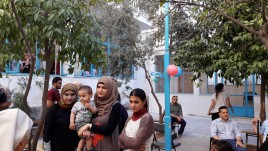
The Armenian Catholic Exarchate of Athens, in synergy with Caritas Hellas, the capital’s archdiocese and the Italian Bishops’ Conference, through Caritas Italy and the national Office for Family Ministry, created a Family Counselling service to respond to the needs of families in difficulty. The initiative, significantly named “Charity is family“, was inaugurated three years ago in the premises of the Armenian Catholic Exarchate of Athens, in the Neos Kosmos district. After the stop caused by the Covid-19 pandemic, it is now back on track to resume and relaunch its mission, extending its scope beyond counselling to include enhanced pastoral exchange on family issues involving the Italian and Greek Churches.
 An Italian delegation travelled to Greece on 3-7 October for this very purpose. The delegation was led by Br Marco Vianelli, head of the Italian Bishops’ Conference’s Office for the Pastoral Care of Families, Danilo Feliciangeli, representing Caritas Italy, members of Italian dioceses keen to set up exchange programmes with Greek families, and volunteers representing Neos Kosmos Aps – an Italian NGO developing a youth centre in Athens. The Counselling service currently supports approximately 30 families on a regular basis. Some of these families have completed the programme and others have just started. Expert assistance is offered by a small team comprising a psychologist, a gynaecologist and a family counsellor, aided by volunteers and supported by the Catholic University of Brescia and by the Italian Confederation of Family Counselling Centres of Christian inspiration.
An Italian delegation travelled to Greece on 3-7 October for this very purpose. The delegation was led by Br Marco Vianelli, head of the Italian Bishops’ Conference’s Office for the Pastoral Care of Families, Danilo Feliciangeli, representing Caritas Italy, members of Italian dioceses keen to set up exchange programmes with Greek families, and volunteers representing Neos Kosmos Aps – an Italian NGO developing a youth centre in Athens. The Counselling service currently supports approximately 30 families on a regular basis. Some of these families have completed the programme and others have just started. Expert assistance is offered by a small team comprising a psychologist, a gynaecologist and a family counsellor, aided by volunteers and supported by the Catholic University of Brescia and by the Italian Confederation of Family Counselling Centres of Christian inspiration.
 “The pandemic has seriously impacted on the needs of both Greek and refugee families. The financial crisis in Greece and the bailout programme set up by the European “Troika” (ECB, EU and IMF) resulted in severe welfare spending cuts, ranging from healthcare to pensions, from employment to education, all of which affected families in particular,” Mr Feliciangeli pointed out. High public debt and low salaries prevent families from living a dignified life and repayment plans cause further indebtedness . In the meantime, immigration is no longer an emergency but a regular occurrence, and it has to be tackled within Greek society in terms of integration and social inclusion. Giving new impetus to the project is a priority.”
“The pandemic has seriously impacted on the needs of both Greek and refugee families. The financial crisis in Greece and the bailout programme set up by the European “Troika” (ECB, EU and IMF) resulted in severe welfare spending cuts, ranging from healthcare to pensions, from employment to education, all of which affected families in particular,” Mr Feliciangeli pointed out. High public debt and low salaries prevent families from living a dignified life and repayment plans cause further indebtedness . In the meantime, immigration is no longer an emergency but a regular occurrence, and it has to be tackled within Greek society in terms of integration and social inclusion. Giving new impetus to the project is a priority.”
“The “Charity is family’ project embraces the heartfelt request made by Pope Benedict XVI at the 7th World Meeting of Families in Milan in 2012. On that occasion he said:, ‘a family from Italy, Germany, France … should take on the responsibility of helping another family’,” Br. Vianelli told SIR. “Greece is a multicultural society and it can help us identify new ways of living together in a multi-ethnic context. With this in mind, we wish to offer our experience in this field to serve the purposes of the project.” For the director of the Italian Bishops’ Conference’s Office for the Family,
“This groundbreaking initiative will not only encourage the development of family pastoral ministry in Greece. In fact it will enhance our own pastoral care by imbuing it with a new vision. Concrete support to families to allow them to meet their material needs is coupled by pastoral care: to guide families and couples in every aspect of their lives, whether concerning the emotional or religious spheres.”
The first step in the restart of the project is to revitalise relations within the Armenian Catholic community by creating a group of ‘families for families’.” Father Joseph Bazouzou, born in Aleppo, Syria, Apostolic Administrator of Armenian Catholics in Greece, will be entrusted with the spiritual accompaniment of these families. The Family Counselling Centre,” concluded Br Vianelli, “is designed to create opportunities for coming together and for addressing both spiritual and psychological needs. On our part, as Office for the Family, our efforts will be directed at promoting twinning between Italian dioceses and the ecclesial communities in Greece. The Italian Bishops’ Conference’s contribution to the project falls within the scope of strengthening the ecclesial community, comprising families in need of pastoral support. Attentive listening will certainly contribute to this process.”











